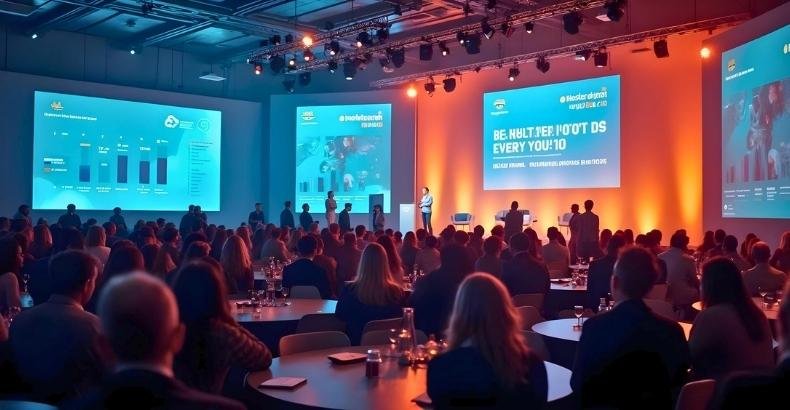Business conferences are not just regular events; they are vibrant ecosystems where ideas ignite, connections flourish, and industries continue to grow. As we deal with changing fields, staying informed about changes in conference dynamics becomes crucial for anyone looking to make an impact. So, what are the top trends in business conferences?
The answer lies in adopting innovation and identifying attendee needs. Hybrid events are gaining popularity, combining in-person and virtual experiences. Additionally, technology integration, sustainability practices, and interactive sessions are reshaping how we approach these gatherings.
With these trends, conferences are becoming more engaging and accessible than ever before. Curious to learn more about how these developments can improve your conference experience? Continue reading to explore the exciting trends transforming business conferences today.
What Makes a Conference Experience Memorable?
Creating a memorable conference experience is essential for attendee satisfaction and engagement. A few key factors contribute to making an event stand out.

Engaging Content
The quality of content delivered during the conference plays a crucial role in its memorability. Attendees want to learn from industry experts and gain actionable insights. Therefore, you need a line-up of speakers who are knowledgeable and engaging. Including diverse perspectives can enrich the conversation and inspire attendees.
Networking Opportunities
Networking is often cited as one of the top reasons for attending conferences. Creating opportunities for meaningful connections can improve the experience significantly. Consider organizing structured networking sessions, breakout groups, or social events to promote introductions and discussions among participants.
Unique Venues
The venue itself plays a significant role in shaping the conference experience. Opting for a unique location can add a special touch to the event. For example, if you are organizing an international business conference in Canada, consider venues with fascinating architecture, outdoor spaces, or nearby local attractions to elevate the overall atmosphere.
Interactive Sessions
Attendees appreciate interactive sessions that encourage participation and engagement. Incorporating activities such as workshops, roundtable discussions, or live polls can make the experience more dynamic. Attendees are more likely to remember an event where they actively contributed to the dialogue.
Memorable Swag
Everyone loves a good giveaway! Providing memorable and useful swag items can leave a lasting impression. Consider practical items that attendees will use long after the event. This not only promotes your brand but also reminds them of their experience at the conference.
What Are the Top Trends in Business Conferences?
Business conferences are continually developing to meet the changing needs of attendees and organizers. Here are some of the top trends currently changing the field of business conferences.

Hybrid Events
Hybrid events combine in-person and virtual attendance, offering flexibility and inclusivity. Attendees can choose how they want to participate, which expands the reach of conferences. To implement a successful hybrid event:
- Choose the Right Platform: Select a platform that supports both in-person and virtual interactions. Look for features like live streaming, chat options, and breakout sessions. This ensures a seamless experience for all attendees.
- Engage Your Audience: Use interactive tools like polls, Q&A sessions, and live chats to engage both in-person and virtual attendees. Encourage participation to promote a sense of community among all participants.
- Record Sessions: Recording sessions allow virtual attendees to access content later. This is beneficial for those in different time zones or unable to attend live. Ensure that all sessions are recorded for future use.
Improved Technology Integration
Technology plays a significant role in modern conferences. From apps to wearable tech, here’s how to make the most of it:
- Event Apps: Create an event app to provide attendees with schedules, speaker information, and networking opportunities. This keeps participants informed and connected throughout the event.
- AR and VR Experiences: Augmented Reality (AR) and Virtual Reality (VR) can enhance the attendee experience. Use these technologies for immersive experiences, such as virtual tours or interactive product demonstrations.
- Live Streaming: Streaming sessions live allows remote attendees to participate in real-time. It also increases accessibility, enabling more people to engage with your content.
Sustainability Practices
Sustainability is increasingly important in conference planning. Implementing eco-friendly practices can attract attendees who value sustainability:
- Digital Materials: Reduce paper waste by using digital resources instead of printed materials. Distribute schedules, brochures, and handouts via email or through your event app.
- Sustainable Venues: Choose venues that prioritize sustainability. Look for locations that use renewable energy, offer recycling programs, and have green certifications.
- Offset Carbon Footprint: Consider offsetting the carbon footprint of your event by investing in renewable energy projects or supporting local environmental initiatives. This demonstrates your commitment to sustainability.
Focus on Networking and Collaboration
Networking remains a vital aspect of conferences. New approaches are enhancing this experience:
- Structured Networking: Implement structured networking sessions, such as speed networking or thematic discussions. This encourages meaningful connections and helps attendees meet relevant contacts.
- Networking Apps: Utilize networking apps that allow attendees to connect before and during the event. Features like profiles and messaging enhance the networking experience.
- Collaboration Spaces: Designate areas within the venue for informal meetings and collaboration. Comfortable seating and a relaxed atmosphere encourage attendees to share ideas.
Personalization and Attendee Experience
Customizing the attendee experience is becoming essential. Here’s how to do it effectively:
- Customizable Agendas: Allow attendees to create their agendas by selecting sessions that interest them. This increases engagement and satisfaction during the event.
- Personalized Communication: Use attendee data to personalize communication before and after the event. Send individualized messages based on their interests and previous interactions.
- Feedback Mechanisms: Collect feedback throughout the conference. Use surveys and polls to gather insights, allowing you to improve future events based on attendee preferences.
Health and Safety Measures
In light of recent global events, health and safety are top priorities:
- Sanitation Stations: Provide hand sanitizing stations throughout the venue. This reassures attendees and encourages good hygiene practices.
- Health Protocols: Implement health protocols, such as mask-wearing or social distancing guidelines. Clearly communicate these measures to attendees prior to the event.
- Flexible Registration: Offer flexible registration and cancellation policies. This accommodates those who may be hesitant to attend in person due to health concerns.
By identifying and implementing these trends, event organizers can create memorable experiences that meet the needs of today’s attendees. Staying informed about what are the top trends in business conferences will help you plan successful events that resonate with participants.
What Are The Different Types of Business Conferences?
Business conferences come in various forms, each serving diverse purposes and audiences. Being familiar with the different types can help you choose the right one for your needs. Here’s a look at some common types of business conferences.
- Trade Shows: These large-scale events showcase products and services from various companies within a specific industry. They offer opportunities for networking, lead generation, and discovering new trends.
- Workshops: Workshops are hands-on, interactive sessions that focus on specific skills or topics. Participants engage in practical activities, making them ideal for professional development.
- Seminars: Typically smaller than workshops, seminars involve expert presentations followed by discussions. They’re great for learning about new ideas and strategies in a particular field.
- Networking Events: These informal events encourage professionals to connect and build relationships. They often feature activities or icebreakers to facilitate conversations and networking.
- Conventions: Conventions are large conferences that can span several days and include various activities, such as keynote speakers, breakout sessions, and networking opportunities. They often draw attendees from multiple sectors within an industry.
- Webinars: Online seminars allow participants to join remotely, making them accessible to a broader audience. They often feature expert speakers and interactive Q&A sessions.
- Retreats: Business retreats focus on team-building and strategic planning. They provide an opportunity for employees to step away from daily tasks and collaborate in a relaxed setting.
- Annual Meetings: These events are usually organized by companies to review the past year’s performance and set goals for the upcoming year. They often involve presentations from leadership and discussions among stakeholders.
Choosing the right type of conference can significantly improve your networking and learning opportunities. Different types of business conferences are designed to be relevant to various objectives and audiences.
How to Stay Ahead of the Trend in Conference Planning?
Staying ahead in the ever-evolving field of conference planning requires continuous learning and adaptation. Here are some strategies to help you stay ahead of the trend:
Follow Industry Leaders
Stay updated by following industry leaders and experts in conference planning. Subscribe to newsletters, attend webinars, and engage in online communities where new ideas are shared. This will keep you informed about emerging trends and best practices.
Attend Other Conferences
One of the best ways to learn is by experiencing other conferences. Attend events, both large and small, to observe how they are organized and executed. Take note of what works well and what could be improved upon.
Seek Feedback
Regularly seek feedback from attendees and stakeholders after each event. Conduct surveys or hold focus groups to gather insights. This information is invaluable for identifying areas for improvement and adapting to participant preferences.
Invest in Training
Investing in training for your team is crucial. Provide opportunities for professional development and encourage team members to attend relevant workshops and courses. This knowledge will help your team stay informed and skilled in the latest trends.
Aim For Innovation
Be open to new technologies and approaches in conference planning. Experiment with new tools, platforms, or formats that could improve the attendee experience. Flexibility and a willingness to adapt are key to staying ahead of the curve.
How Impactful Business Conferences Are on Networking?
Business conferences are more than just presentations and panels; they are vibrant hubs for networking and relationship-building. The impact of these events on networking is profound, offering different opportunities for professionals to connect. Here’s how impactful business conferences can be for networking.

Face-to-Face Interaction
Nothing beats the power of in-person conversations. Meeting someone face-to-face promotes a deeper connection and allows for more meaningful discussions compared to emails or phone calls.
Diverse Attendees
Conferences attract a wide range of professionals from various industries. This diversity broadens your network and exposes you to different perspectives and ideas, enriching your professional experience.
Structured Networking Opportunities
Many conferences offer dedicated networking sessions, such as speed networking or roundtable discussions. These structured formats emphasize the impact of business conferences on networking, encouraging attendees to connect intentionally and efficiently.
Common Interests
Being in an environment with like-minded individuals creates an instant connection. Sharing interests and challenges makes it easier to strike up conversations and find common ground.
Access to Industry Leaders
Conferences often feature keynote speakers and industry experts. Engaging with these leaders can provide valuable insights and opportunities for mentorship, helping you grow your professional network.
Follow-Up Opportunities
After the conference, the connections made can lead to further interactions. Attendees can exchange contact information, making it easier to follow up and maintain relationships long after the event.
So, business conferences are powerful tools for networking, offering a wealth of opportunities to connect, learn, and grow. Capitalizing on these moments can significantly improve your professional journey.
Frequently Asked Questions (FAQs)
Here are some frequently asked questions about trends in business conferences. These questions cover aspects not discussed elsewhere in the article, offering additional insights for readers.
How Do Business Conferences Focus on Inclusivity?
Inclusivity is a significant trend in business conferences today. This includes offering diverse speaker line-ups, accessible venues, and virtual attendance options. Event planners aim to create environments where everyone feels welcome and valued.
How Can Organizers Measure the Success of Their Conference?
To measure conference success, organizers can use metrics such as attendee satisfaction, engagement levels, and return on investment. Surveys and feedback forms can provide insights into what worked well and what can be improved for future events.
Which Business Conference Sponsorship Trends Are Most Popular?
Sponsorship trends are shifting towards more strategic partnerships. Brands are looking for individual sponsorship packages that offer meaningful engagement rather than traditional logo placements. Event organizers must focus on creating value for sponsors through unique opportunities.
How Do Virtual Events Compare to In-Person Conferences?
Virtual events offer flexibility and wider reach, but may lack the personal connections found in in-person conferences. Attendees often appreciate the convenience of virtual events, while in-person conferences provide networking opportunities and immersive experiences.
How Can Small Businesses Benefit from Business Conferences?
Small businesses are increasingly taking advantage of niche conferences to connect with targeted audiences. They often focus on building relationships and promoting community, emphasizing personalized experiences and interactive sessions to maximize impact.
Final Words
As we move through the exciting world of business conferences, staying ahead of the curve is vital for success. Being aware of what are the top trends in business conferences helps organizers create engaging experiences that resonate with attendees. These trends not only improve learning but also create meaningful connections.
By taking advantage of hybrid formats, integrating technology, and prioritizing sustainability, your conference can stand out and attract diverse participants. Each trend presents unique opportunities to innovate and make your event memorable.
So, the future of business conferences is bright and full of possibilities. As you plan your next event, keep these trends in mind to ensure a remarkable experience for all involved. Let’s make every conference a memorable journey together.